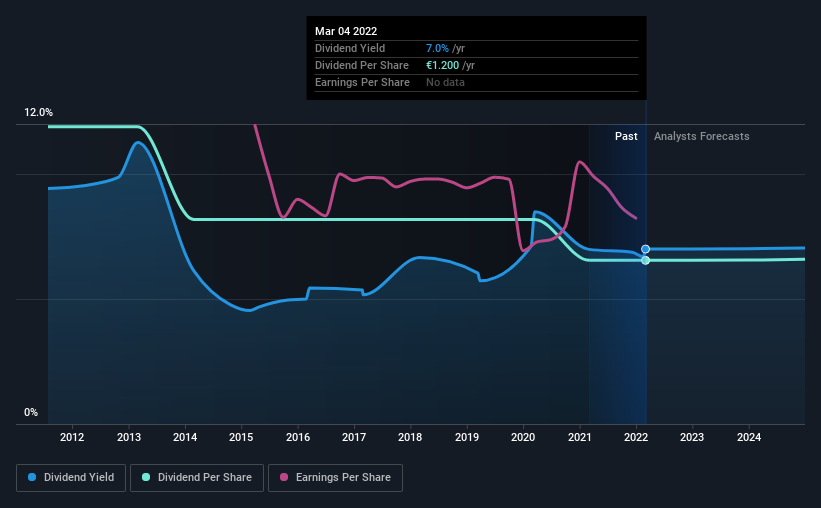The board of Proximus PLC (EBR:PROX) has announced that it will pay a dividend of €0.49 per share on the 29th of April. This means that the annual payment will be 4.9% of the current stock price, which is in line with the average for the industry.
Check out our latest analysis for Proximus
Proximus' Dividend Is Well Covered By Earnings
We like to see a healthy dividend yield, but that is only helpful to us if the payment can continue. Prior to this announcement, Proximus was paying out 87% of earnings and more than 75% of free cash flows. This is usually an indication that the focus of the company is returning cash to shareholders rather than reinvesting it for growth.
Over the next year, EPS is forecast to fall by 0.3%. If the dividend continues along recent trends, we estimate the payout ratio could be 60%, which we consider to be quite comfortable, even though the current levels are slightly more elevated.

Dividend Volatility
While the company has been paying a dividend for a long time, it has cut the dividend at least once in the last 10 years. The dividend has gone from €2.18 in 2012 to the most recent annual payment of €1.20. Doing the maths, this is a decline of about 5.8% per year. Declining dividends isn't generally what we look for as they can indicate that the company is running into some challenges.
Proximus May Find It Hard To Grow The Dividend
Given that the track record hasn't been stellar, we really want to see earnings per share growing over time. It's not great to see that Proximus' earnings per share has fallen at approximately 3.3% per year over the past five years. Declining earnings will inevitably lead to the company paying a lower dividend in line with lower profits.
Proximus' Dividend Doesn't Look Sustainable
Overall, we don't think this company makes a great dividend stock, even though the dividend wasn't cut this year. The track record isn't great, and the payments are a bit high to be considered sustainable. We would probably look elsewhere for an income investment.
Investors generally tend to favour companies with a consistent, stable dividend policy as opposed to those operating an irregular one. Meanwhile, despite the importance of dividend payments, they are not the only factors our readers should know when assessing a company. As an example, we've identified 2 warning signs for Proximus that you should be aware of before investing. Is Proximus not quite the opportunity you were looking for? Why not check out our selection of top dividend stocks.
New: Manage All Your Stock Portfolios in One Place
We've created the ultimate portfolio companion for stock investors, and it's free.
• Connect an unlimited number of Portfolios and see your total in one currency
• Be alerted to new Warning Signs or Risks via email or mobile
• Track the Fair Value of your stocks
Have feedback on this article? Concerned about the content? Get in touch with us directly. Alternatively, email editorial-team (at) simplywallst.com.
This article by Simply Wall St is general in nature. We provide commentary based on historical data and analyst forecasts only using an unbiased methodology and our articles are not intended to be financial advice. It does not constitute a recommendation to buy or sell any stock, and does not take account of your objectives, or your financial situation. We aim to bring you long-term focused analysis driven by fundamental data. Note that our analysis may not factor in the latest price-sensitive company announcements or qualitative material. Simply Wall St has no position in any stocks mentioned.
About ENXTBR:PROX
Proximus
Provides digital services and communication solutions in Belgium and internationally.
Good value with proven track record and pays a dividend.
Similar Companies
Market Insights
Community Narratives





